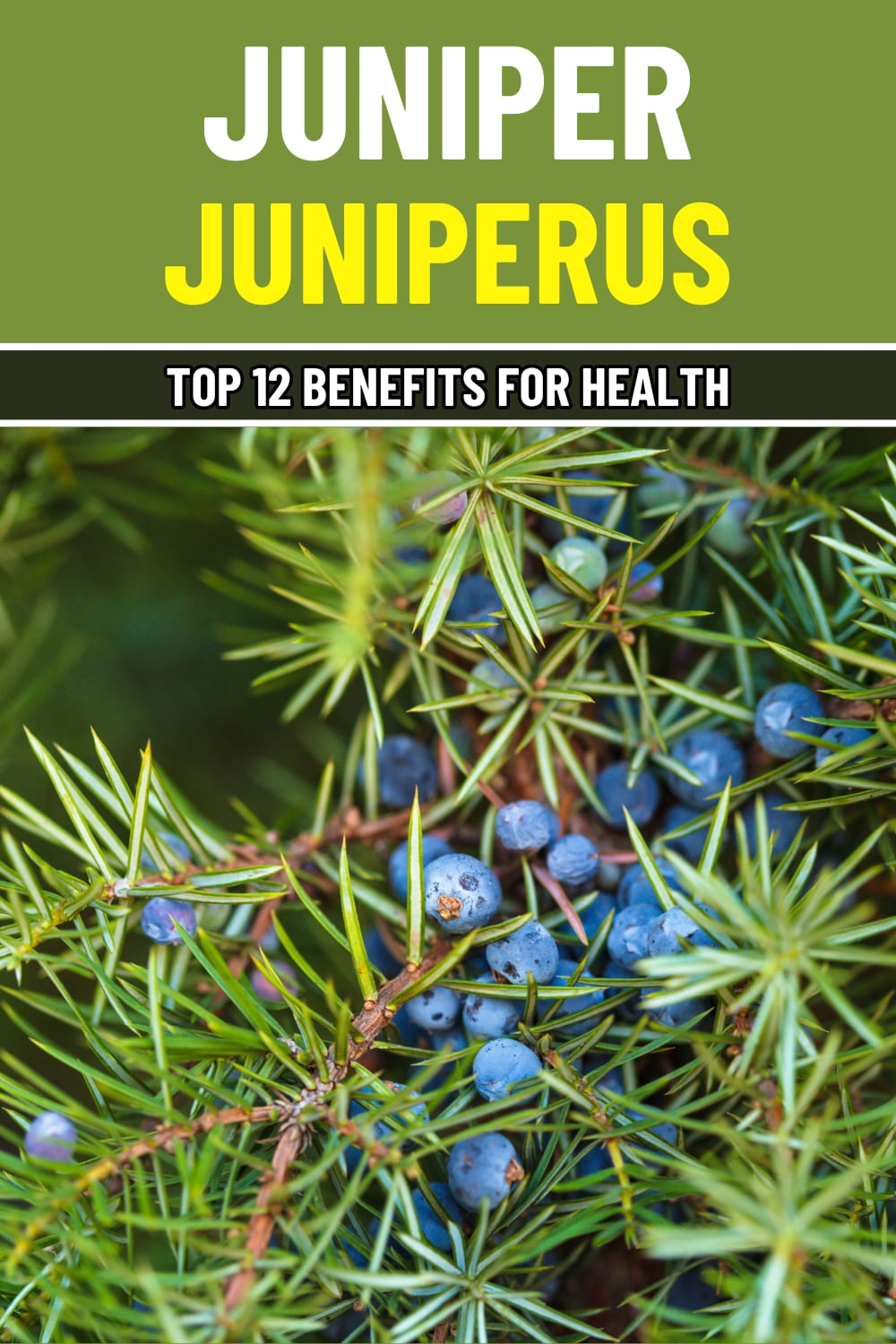Juniper (Juniperus) has been revered for centuries as a versatile plant with exceptional medicinal and aromatic properties.
This evergreen shrub, characterized by its tiny, potent berries, is not only a culinary delight but also a powerhouse of health benefits.
Whether it’s used in teas, essential oils, or natural remedies, juniper offers a treasure trove of wellness-enhancing compounds. Let’s explore the remarkable health benefits of juniper and discover how to harness its potential.
#1. Boosts Digestive Health
Juniper berries are celebrated for their ability to stimulate the production of digestive enzymes, aiding in the efficient breakdown of food.
A study published in Natural Product Communications (2011) highlights their carminative properties, which help alleviate bloating, gas, and indigestion.
Rich in essential oils like alpha-pinene and myrcene, juniper berries support a healthy gut by reducing inflammation and promoting regular bowel movements.

#2. Natural Diuretic
Juniper acts as a mild diuretic, promoting increased urine production and helping the body flush out excess fluids and toxins.
This diuretic effect, supported by research in the Journal of Ethnopharmacology (2017), makes juniper an excellent choice for reducing water retention and supporting kidney health.
#3. Loaded with Antioxidants
Rich in flavonoids, polyphenols, and vitamin C, juniper berries pack a powerful antioxidant punch.
Antioxidants are essential for neutralizing free radicals that can damage cells and contribute to chronic diseases.
A study in Antioxidants (2020) found that juniper extracts help combat oxidative stress and support overall cellular health.

#4. Anti-inflammatory Properties
The anti-inflammatory compounds in juniper, including terpenes and flavonoids, make it a natural remedy for reducing inflammation in joints and muscles.
Research published in Planta Medica (2014) supports its use in alleviating symptoms of arthritis and gout by soothing pain and swelling.
#5. Strengthens the Immune System
With 100 grams of juniper berries containing about 37 mg of vitamin C (41% of the daily recommended intake), they bolster the immune system by enhancing white blood cell production and combating infections.
Their antimicrobial properties further protect against common pathogens.

#6. Enhances Respiratory Health
Juniper essential oil is a natural expectorant that clears mucus and soothes respiratory passages.
Its aromatic compounds, such as camphene, help alleviate symptoms of colds, coughs, and sinus congestion, offering relief to those with seasonal respiratory issues.
#7. Supports Skin Health
Juniper is a well-known remedy for acne, eczema, and psoriasis, thanks to its antibacterial and anti-inflammatory properties.
Its antioxidants, such as vitamin C and flavonoids, also promote collagen production, improving skin elasticity and reducing the appearance of fine lines.

#8. Regulates Blood Sugar Levels
Preliminary studies, including one published in the Journal of Ethnopharmacology (2008), suggest that juniper berries may help regulate blood sugar levels and improve insulin sensitivity.
This makes them a promising complementary aid for managing type 2 diabetes.
#9. Detoxifies the Body
Juniper’s diuretic properties extend to detoxification, aiding liver and kidney function by flushing out harmful toxins.
This cleansing effect helps the body maintain optimal organ health and prevents the buildup of waste products.

#10. Relieves Stress and Anxiety
Aromatherapy with juniper essential oil provides a calming effect on the nervous system.
Its soothing aroma reduces stress, alleviates anxiety, and promotes relaxation, making it a natural remedy for mental well-being.
#11. Promotes Healthy Hair
Juniper berry infusions strengthen hair follicles, reduce dandruff, and enhance scalp health.
The antimicrobial properties of juniper address common scalp infections, leaving hair shinier and healthier.

#12. Fights Bad Breath
Juniper’s natural antibacterial properties make it an effective remedy for combating bad breath.
Gargling with diluted juniper tea or oil acts as a natural mouthwash, reducing bacterial growth and promoting oral hygiene.
How to Use Juniper for Health
1. Juniper Tea for Digestion and Detox
Juniper tea is a simple yet effective way to harness its digestive and detoxifying properties. Crush 1 teaspoon of dried juniper berries to release their oils, then steep them in 1 cup of boiling water for 10 minutes.
Strain the tea and sip it 1–2 times daily to relieve bloating, improve digestion, and gently detoxify your system. Enhance the flavor with a touch of honey or a slice of lemon for added health benefits.
2. Juniper Oil for Skin and Joint Relief
To soothe irritated skin or reduce joint pain, prepare a massage blend with 10 drops of juniper essential oil and 2 tablespoons of a carrier oil like coconut or almond oil.
Gently massage this mixture onto affected areas to alleviate inflammation and discomfort. Regular use can improve skin texture and offer relief for conditions like arthritis and muscle soreness.
3. Juniper Infusion for Hair Health
For healthier, dandruff-free hair, boil 2 cups of water with 1 tablespoon of dried juniper berries for 10 minutes. Allow the infusion to cool, strain, and use it as a final rinse after shampooing.
This rinse strengthens hair follicles, reduces dandruff, and leaves your scalp refreshed and revitalized.

Cautions and Precautions
Excessive consumption of juniper can irritate the kidneys or cause digestive discomfort.
Juniper is not recommended during pregnancy or breastfeeding, as it may stimulate uterine contractions.
Test a small amount before use to ensure you are not allergic. Ensure that juniper products are obtained from reputable sources to avoid contamination.
Disclaimer
This article is for informational purposes only and not a substitute for professional medical advice.
Always consult a healthcare provider before incorporating juniper into your diet or wellness routine, particularly if you have existing medical conditions.

12 Health Benefits of Juniper You Didn’t Know About
